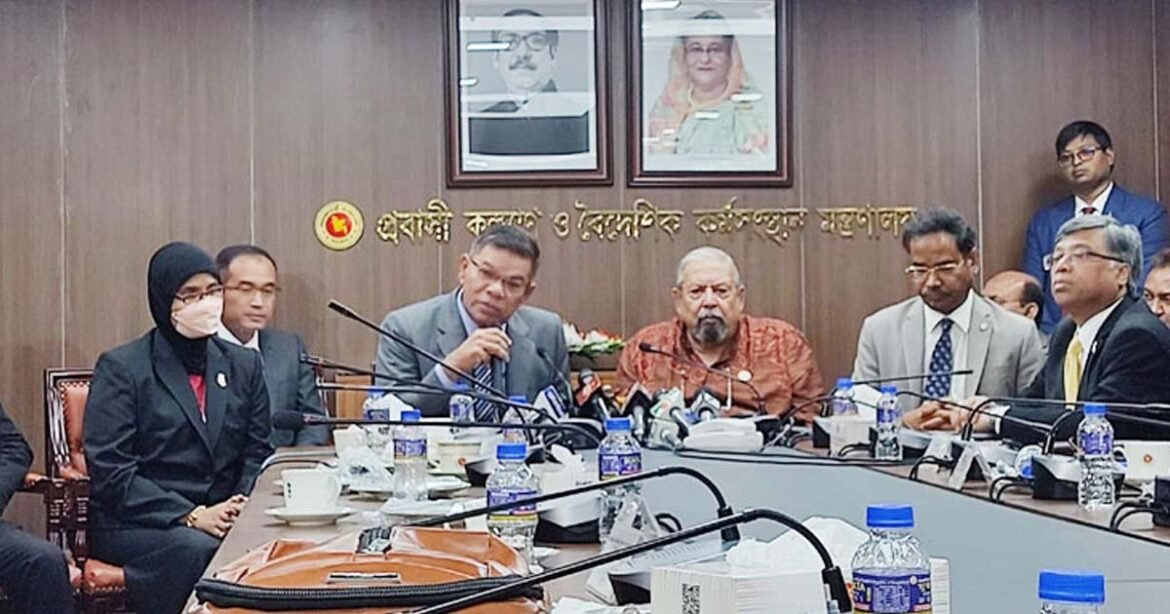Malaysia is going to reconsider the immigration process and fast-track the program for Bangladeshi workers. The decisions were promised by Malaysian Home Minister Saifuddin Nasution Ismail during his visit to Dhaka.
The Malaysian Home Minister arrived in Dhaka on Saturday on a two-day “working visit”. This is the Southeast Asian nation’s first ministerial visit since the formation of its new government. Upon his arrival at Hazrat Shahjalal International Airport at 3:00 pm on Saturday, senior authorities and the Malaysian High Commission in Dhaka welcomed the home minister. The visit’s main focus was on simplifying the process of sending the workforce to Malaysia.
“A fruitful discussion on two issues”
On Sunday, Mr. Saifuddin met with representatives from the Ministry of Expatriate Welfare and Foreign Employment. According to the Malaysian minister, “we had a fruitful discussion on two issues today. The first one focuses on speeding up the calibration program. Second, the Malaysian government is dedicated to reducing the cost of immigration.”
You can also read: Why nine western countries closed consulates in Türkiye?
He mentioned that there are currently 450,000 Bangladeshi workers among Malaysia’s 1.5 million foreign workers. That’s why Bangladesh tops the list of all 15 nations providing immigrants. The economic contribution of Bangladeshi laborers to Malaysia is substantial.
Regarding the recalibration program, he said, “there are many illegal workers in Malaysia. We are validating them through a process. This program has initiated from last January 27. I’d like to let you know that in the past week, we have approved legalization requests for 55% of Bangladeshis. I have requested Minister Imran Ahmed for cooperation. Let Bangladesh do their part so that we can meet the requirements of our workers.”
Reducing cost and fast-tracking the immigration process
Malaysia can recruit up to 550,000 Bangladeshi workers into their nation using the fast-track process. On Sunday, the Malaysian Home Minister said that the country might start a fast-track system instead of the complicated and monopolistic system for hiring Bangladeshi workers.
He remarked, “we have reduced the approval time. Previously it used to take 20-30 days. Nowadays, permission is granted in 1-2 days. This is a major policy change.”
The Malaysian counterpart has also agreed to look into the corruption in the immigration process and reduce costs for the workers.
Saifuddin declared, “We discussed the former agreement. The Malaysian government wants to facilitate the process so that the main goal can be reached. The key objectives are to provide for necessities, cut expenses, and protect foreign employees’ dignity. We are prepared to make changes if the current procedure does not achieve that purpose.”
What led to the reduction of costs for immigrants?
Saifuddin met with a group from the Bangladesh Association of International Recruiting Agencies (BAIRA) earlier on Saturday. He addressed concerns including health screenings, auto-rotation for employment agencies, and the absence of e-Visa processing facilities, all of which had exacerbated the difficulties in getting the workers to Malaysia.
In the discussion, BAIRA leaders spoke with the minister about the unnecessarily complicated and monopolistic recruitment process. They continued by saying that the agency that submitted the work order initially presently owes a service fee to another agency in the amount of approximately Tk 1.5 lakh, or 5,500 Ringgits for each worker. The issuing of an e-Visa once took just a few hours, but now it takes 20 to 25 days. For Bangladeshis who want to work in Malaysia, these added expenses and delays are increasing the cost of relocation.
The Malaysian home minister admitted the corruption in MiGRAMS and noted that such a mistake shouldn’t have been made with the less fortunate.
According to the memorandum of understanding (MoU) agreed upon between Bangladesh and Malaysia in December 2021, health screenings in Bangladesh are not required. A worker must spend Tk 7,500 for a health examination and an additional 100 ringgits (Tk 2,700) for registration in the MiGRAMS program. These expenses should be covered by a Malaysian employer rather than the Bangladeshi employees.
Baira secretary-general Shameem Ahmed Chowdhury Noman said that Saifuddin was aware of the problems with the recruitment process and was planning to meet with Bangladesh’s Expatriates’ Welfare and Overseas Employment Minister Imran Ahmad today to discuss the issue.


